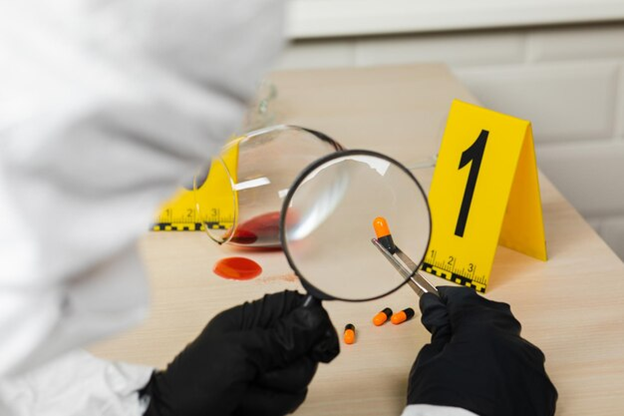Forensic Science Investigation
The program spans about two years, consisting of six TRIMESTERs. Courses cover core areas of forensic science, including crime scene investigation, biology, chemistry, pathology, digital forensics, firearms examination, and specialized topics. Practical components include field practicum and a capstone project focusing on real-world forensic investigations.
Upon completion of this diploma, students will possess comprehensive knowledge and practical skills in various disciplines of forensic science. Graduates will be equipped for careers in crime scene investigation, forensic laboratories, law enforcement agencies, digital forensics units, and other fields related to forensic science and criminal justice.

Diploma in Forensic Science Investigation
Duration: 2 Years
FSC 100: Introduction to Forensic Science
- Introduction to Forensic Science and Criminalistics
- Crime Scene Investigation Techniques
- Forensic Evidence Collection and Preservation
- Criminal Law and Legal Procedures
FBC 100: Forensic Biology and Chemistry
- Forensic Biology: DNA Analysis and Serology
- Forensic Chemistry: Drug Analysis and Toxicology
- Trace Evidence Analysis
Microscopy and Analytical Techniques
FPA 100: Forensic Pathology and Anthropology
- Forensic Pathology and Autopsy Procedures
- Forensic Anthropology and Osteology
- Forensic Odontology
- Entomology in Forensic Investigations
DFCY 100: Digital Forensics and Cybercrime
- Digital Forensics: Computer and Mobile Device Analysis
- Cybercrime Investigations and Cybersecurity
- Data Recovery and Analysis
- Cryptography and Network Forensics
FTE 100: Firearms and Toolmark Examination
- Firearms Examination and Ballistics
- Toolmark Analysis and Comparison
- Fire and Explosion Investigation
- Document Examination and Forgery Analysis
SP 100: Specializations and Practicum
- Specialized Topics in Forensic Science (e.g., Forensic Psychology, Forensic Entomology)
- Field Practicum in Forensic Investigations
- Research Methodology in Forensic Science
- Capstone Project in Forensic Science Investigation
Students have to contact the school administration if they want to take extra credits or transfer credits to pursue the Diploma Certificate or Associate of Applied Science (A.A.S.) Degree in their field of interest. Students will select required number courses in each of the areas listed to meet general education requirements graduation for the A.A.S. Some of these courses can be transferred directly from and to the university system and may be substituted for recommended courses on the outline. Students should speak with an advisor before doing so these selective courses are required for all students.
- Selected Communication Course (Choose two for Diploma or three for the Associate)
ENGL 100: Fundamentals of Speech
CPL 100: Career Planning
CPL 101: Communications and Career Strategies
ENGL 101: Composition
ENGL 102: composition
- Selected Mathematics Course (Choose two for Diploma or three for the Associate)
MATH 100:General Math
MATH 101:Intermediate Algebra
MATH 102:College Algebra
- Selected Social Science Course (Choose two for Diploma or four for the Associate)
ECON 105:Leadership
ECON 101:Principles of Microeconomics I
ECON 102:Principles of Macroeconomics II
SOC 101:Introduction to Sociology
PSYC 101: Introduction to Psychology
HIST 101: History
